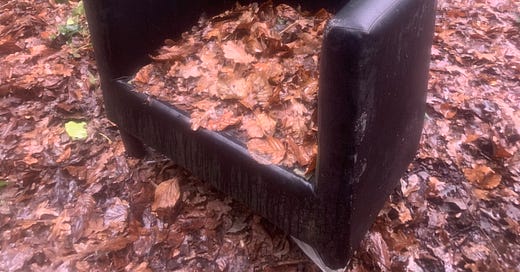Dear Reader,
An American friend calls me “a fall kind of guy” and I offer my Autumn greetings to you all. I feel most at ease in this season of underfoot crunch, convivial scarves, knowing wind, and nostalgic conkers.
I’ve seen a lot of Autumns. “I’m older than I was and younger than I’ll be” Simon & Garfunkel sang. At 47 I’m still a baby, but I’ve heard people in their twenties call me an elder (and survive). I find myself at a life stage where the sense of opportunity cost grows keen. Everything I do now is palpably something else I choose not to do. There are a certain number of weeks and weekends left. There is time to read hundreds but probably not thousands of good books, and perhaps write a few more. There will be tasty treats ahead and occasional beetroot sambhar. There could be university graduations and even grandchildren. I will sink again into glorious peach melba sunsets, and find new foreign language films worthy of second viewings. There will be wee drams of Lagavulin 16 to extend and deepen time after midnight, and plenty of laughter about nothing in particular. Let the weeks, months and years roll on. And yet, and yet. This is the second half. There is no longer an indefinite horizon of ‘later’.
I came to Substack as a Twitter refugee, forced into exile by its degradation into X. I am also on Substack Notes and have settled into my main new digital home. I am committed to this place, but after the wedding and the honeymoon there is the marriage, which sooner or later means marriage counselling, so let’s start there. This platform is a friendly and encouraging place, but it’s also a content machine that uses us to provide a return on investment to venture capitalists. Substack ensures that outcome with a more-is-better and you-can-do-it superego that manifests as a phantom digital cheerleader who haunts writers algorithmically with relentless coercion in the name of support. The tacit injunction to keep churning out words feels like being forced to be free. I paraphrase, but the Substack mantra is always some version of: ‘Writing is your duty, and don’t you just love your duty?’.
Substack’s warm welcome to your creative potential is a lovely thing, but it has a shadow. Socially sanctioned compulsive writing risks information overload, a dilution of creative intensity, a flattening of cultural amplitude, and widespread intellectual obesity. How wonderful that there is a dedicated place online for everyone to find their writing voice, and for writers to be paid. At the same time, I fear being complicit in a regression towards pervasive mediocrity, in which everyone is writing, few say anything worth reading, our nose for quality falls off, and many don’t even know what they have lost.
I am guided here by the idea that we should all “carry what is ours to carry”. Writing is a kind of carrying in which we are willingly burdened until we can lay down what we have to say without breaking it; in the context of writing I believe that means we should “share what is ours to share”. This injunction is a version of Annie Dillard’s advice to “circle round and round your life….Know your own bone: gnaw at it, bury it, unearth it, and gnaw at it still.”
Writing is a craft and regular practice is good for your prose quality, but the best writing is not just technically pleasing. The writing I believe to be worth fighting for and waiting for is truly personal writing that transmits a quality of soul. Such writing is simultaneously “most personal” and “most universal” in Carl Rogers’s sense. When we find what is ours to say we allow others to feel the exquisite solidarity of singularity in which our uniqueness is perhaps the most sacred thing we have in common. Such writing can only arise by living and reading what is ours to live and read. Only then does writing flow like a gift we are obliged to share.
A friend in the intelligence community informed me that the capacity to distinguish between what is interesting and what is important is the main thing that makes spies valuable, and also what keeps them alive. The value of this capacity applies to creativity too, so I aim to share what feels important for me personally to share, rather than merely what interests me, or because it’s time to post.
And next week I will start this new season of The Joyous Struggle with something that has touched me, that I am sure is important - the work of Cynthia Bourgeault.
Yours Aye,
Jonathan.





Excellent thoughts and look forward to what you have to say about the work of Cynthia , as she is amazing .
I’ve come to Substack as a refugee too, still finding my voice. Your post helps me to continue that search and not feel obliged to just send things out because it is Tuesday and my readers expect something from me on Tuesdays.
Second thoughts on Substack’s business model and venture capitalists aside, I do value this platform as a space where you can be unashamedly intellectual. Not to show off but because we need to work our intellect in the same as we need to work our muscles. This only works in the exchange with others. I am deeply grateful that this thoughtful exchange of curious and wandering minds still is possible after the disappointments with Twitter, Facebook and LinkedIn.